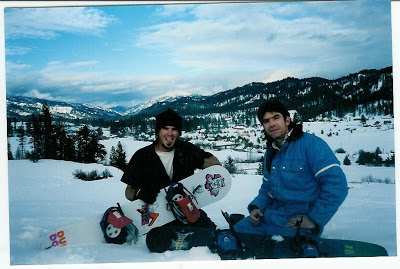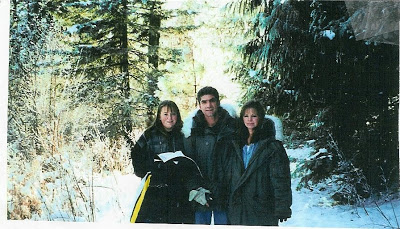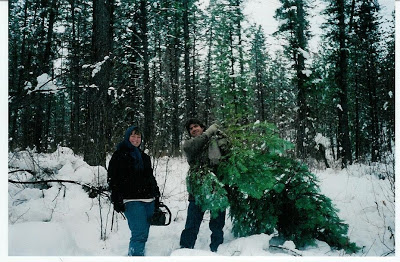Monday, August 17, 2009
A Crime of Cowardice: The Unjust Imprisonment of Scott Molen

When he was a free man: Scott Molen (right) enjoys a snowboarding trip with a friend. Molen is presently serving a prison sentence for a crime he didn’t commit — a fact acknowledged by one of the people responsible for putting him behind bars.
“When you boil the whole thing down and look at it,” comments Ken McKay regarding the conviction of Boise resident Scott Molen on charges of sexual misconduct with his step-granddaughter, “there wasn’t a single shred of evidence.”
Certainly, the prosecution assembled a lurid and shocking story, anecdote-rich and heavily seasoned with outrage. But examined dispassionately, trying to make the evidence support the allegations is as futile as trying to sit on a cloud.
“[T]here were kind of fantastic charges about — for instance, there was a pair of [girl’s] undergarments that had a blood stain in them,” McKay recalls, but this piece of critical physical evidence was “never produced.”
This was probably not the product of an oversight, but rather a deliberately deceptive partial disclosure by an opportunistic prosecutor: The bloodstained underwear were discovered when the purported victim, a pre-pubescent girl, was living in Phoenix, Arizona, nearly 1,000 miles from the man accused of molesting her.
At the time, the alleged victim’s mother was effectively living with a boyfriend of exceptionally dubious character (her most recent of several paramours of that variety) who left the young girl terrified, according to people who spoke with her.
Rather than incriminating Scott Molen, the underwear should have served as a critical piece of exculpatory evidence — assuming that the garment even existed.
There was also a significant contradiction in the prosecution’s description of the location at which the supposed defilement of the child took place. The original narrative described episodes of abuse taking place in a camper. But this was impossible, as McKay recalls, because the defense was able to demonstrate that “the camper was crushed by snow” before such abhorrent acts could have taken place therein.

Christmas past: Scott Molen flanked by his wife Connie (right) and her daughter Mandi.
McKay likewise criticizes the interviewing techniques employed by the nurse working for the Child At Risk Evaluation Services (CARES) of St. Luke’s Hospital in Boise during the original examination in July, 2005.
“There was a point … [when] the CARE interviewer made a pretty critical mistake when she was interviewing” the alleged victim, McKay insists. There was a point in the interview, easily discerned by a reasonably careful observer, at which the interviewer “actually put her words, used her own words to describe what the young woman was saying and from that point forward in the interview [the alleged victim] used the interviewer’s words.”
This is a critical point: From that point it was the interviewer who was effectively telling the story, rather than the supposed victim. The CARES nurse was prompting the girl, guiding her, molding the language in such a way as to fit the standard template of a sex offense charge. “I remember watching [the recorded interview] and thinking, wow that’s really, that’s really incorrect,” McKay relates.
All of this adds up to abundant reasonable doubt, McKay insists: “[B]ased on the evidence, boy, I couldn’t say the state made their case.” Yet McKay, who served as foreman of the jury that convicted Molens, didn’t act on that conclusion until a year after Molens was sent to prison.
McKay’s comments, as quoted above, were extracted from a lengthy interview conducted by a private investigator hired by Scott Molens‘ wife Connie as part of an attempt to overturn the patently unjust conviction — and, hopefully, to impose some measure of accountability on those responsible for it.
Like too many spouses and family members of unjustly convicted people, Connie has assembled and collated a huge amount of evidence regarding the official misconduct, abuse of discretion, and corruption that characterized the prosecution of her husband. Examining that material, I am struck by the fact that Molen would still be a free man (well, as free as any of us are in late imperial America) if one of his fellow citizens had thought like a citizen, rather than behaving like a dutiful collectivist drone.
Long before McKay and his colleagues were sequestered to deliberate the charges against Scott Molens, it was clear that the prosecution’s case was less substantial than the reflected shadow of a boiled ghost.
Yet McKay, who could have — and should have — either built a coalition for acquittal or hung the jury, meekly submitted to the reflexive punitive instincts of the majority.
“I think some of the people that were [on the jury], I think they had decided that he was guilty pretty early on and there was really no reasoning with them about that,” McKay recalls.
An appropriate word to describes that attitude is “prejudice”; a better one might be “bigotry,” a term describing a prejudice that has made itself entirely impervious to evidence. That is a perfectly suitable term to describe an unreasoning determination to convict a defendant irrespective of the evidence. McKay is an engineer by training; his professional credo is “In God we trust; everybody else bring your data.”
As jury foreman, McKay was ethically required to make every effort to overcome the bigotry of his fellow jurors using the tools of rational thought provided to him by his academic training and innate intelligence.
Rather than distinguishing himself by standing fast in defense of an indispensable principle — namely, that the state has to prove its case against the accused — McKay sought refuge in the consensus of the collective: “I remember … we had gone I think several hours in deliberation and a few of us were dug in [on behalf of acquittal] and the guilty people were adamant that he was guilty … I was thinking, well, man, eight other people say that he’s guilty so where am I, what am I missing here?”
I cannot recall ever being exposed to a more perfect specimen of collectivist thought. Here was a man sufficiently intelligent and perceptive to recognize that the prosecution had failed to prove its case, yet his faculty for rational action was preempted by the irresistible need to conform — even at the price of an innocent man’s freedom.

Confronted with a prosecution that couldn’t muster a substantive case, McKay focused not on the state’s missing evidence, but rather on his own supposed delinquency for failing to see things the way the State required him to.
To someone capable of exercising a modicum of critical thought, the grounds for reasonable doubt were so abundant as to suggest that the prosecution of Scott Molen was an act of deliberate, conscious malice.
The abuse of Molen’s step-granddaughter supposedly began in 2004, when the child was eight years old. During a sleep-over with friends in June 2005, the girl made comments that were construed as “disclosure” of sexual abuse.
In short order she was interviewed by Boise Police Officer Tammy Kennedy, who reported that the girl had described multiple sexual contacts, including up to a dozen instances of full intercourse.
The original audiotape of that interview, however, was conveniently lost. Although Kennedy’s report — which contained adult sexual expressions not likely to have fallen from the mouth of an 8-year-old girl, however carnally precocious — was dated June 2005, it strongly resembles the CARES interview in both tone and substance; this is significant since Kennedy’s report wasn’t filed until after the CARES interview.
Furthermore, during the trial the child repudiated much of what she had supposedly told Officer Kennedy, and at one point suggested that she needed Kennedy’s help to “remember” certain things she had allegedly disclosed.
The initial physical examination of the child failed to turn up conclusive evidence of assault rape, which was the charge initially listed by Officer Kennedy. The CARES nurse reported that the child’s genitals appeared to display injuries “suggestive of blunt force penetrating trauma often seen in sexual abuse.” However, the results of a a more detailed examination using a specialized instrument called a colposcope were withheld from the defense for two years; it wasn’t until well into the trial that this critical physical evidence was obtained through subpoena.
During his rebuttal testimony on behalf of the defense, Dr. Edward Friedlander, chairman of the Department of Pathology at Kansas City University College of Osteopathic Medicine, evaluated the colposcopic images. His conclusion was that they depicted the anatomy of a child who was a “perfectly intact virgin,” rather than one who had been forcibly violated ten or twelve times, as the prosecution had alleged.
Scott was never put under arrest prior to his conviction, which is a curious oversight if he were the kind of bipedal predator who molests little girls. A search warrant for his home was returned to the court without being executed, an oddity that suggests, once again, that investigators didn’t really consider Scott a credible suspect. Yet the prosecution — an apparatus designed to secure convictions, not to pursue a true and just verdict — continued its plodding, relentless assault.
As almost always happens in cases of this kind, Scott was approached by the prosecutor with a “deal”: If he had been willing to admit to unspecified criminal “misconduct” with the child, he would be given a “lenient” sentence — six months to a year behind bars — with assurances that his life would not be ruined by having his name placed on the sex offender registry. As he was guilty of exactly nothing, Scott turned down the “deal,” most likely prompting the prosecution to exert itself to make an example of him.
Convicted on a single count of “lewd and lascivious conduct with a child,” Scott will not come up for parole for several more years — and he won’t be granted parole unless he not only is willing to admit to a crime he clearly didn’t commit, but passes a lie detector test to demonstrate that he believes that he committed the crime.
“Scott spends his time in prison in the company of people who really did vile, disgusting things like the ones he was falsely accused of,” his wife Connie told Pro Libertate. “Among themselves, they’re completely open in admitting what they did. Some of them even brag about how all they have to do is to admit their offenses and they can be paroled and go out and commit the same crimes all over again. And Scott will stay in prison just as long as the system can hold him, because he never did those awful things and will never tell the lies the system demands of him.”
Ken McKay, the jury foreman who now admits Molen’s evidence, was entirely willing to endorse and sustain the lies of the system that stole Molen’s freedom. Despite knowing that the case assembled by Prosecutor Justin Whatcott was entirely spurious, McKay was willing to stand in the jury box and read a guilty verdict he knew to be unjust while looking his victim in the eye.
There are crimes of passion, of calculation, of opportunity. The imprisonment of Scott Molen reflects the professional depravity of Whatcott and his comrades, to be sure, but it was made possible by a crime of cowardice committed in the jury room.
QUICK UPDATE:
Please forgive the delay in posting your valued comments. I’m in the hospital, and will probably be here until at least tomorrow (Thursday) with a really nasty GI infection. I’m learning it’s difficult to type while plugged into an IV stand….
Be sure to tune in to Pro Libertate Radio on the Liberty News Radio Network.

Dum spiro, pugno!
Content retrieved from: http://freedominourtime.blogspot.com/2009/08/crime-of-cowardice-unjust-imprisonment.html.




























